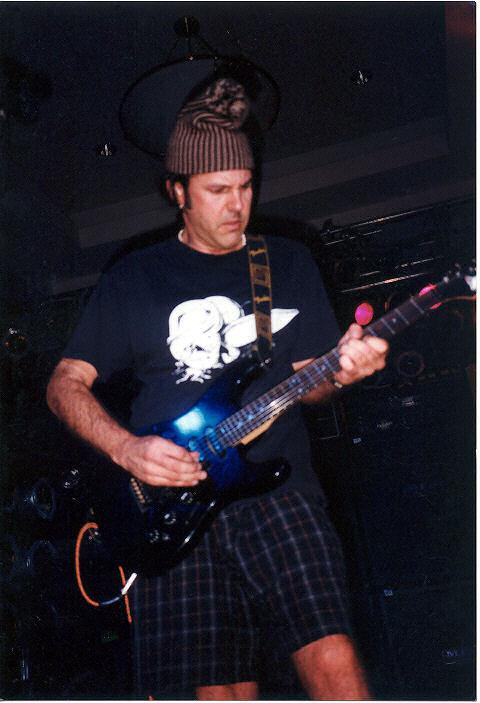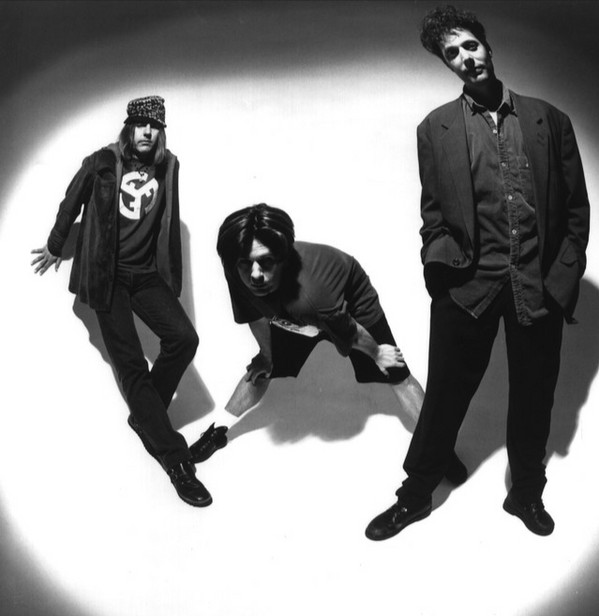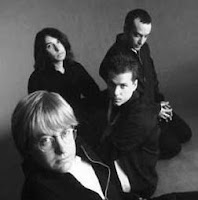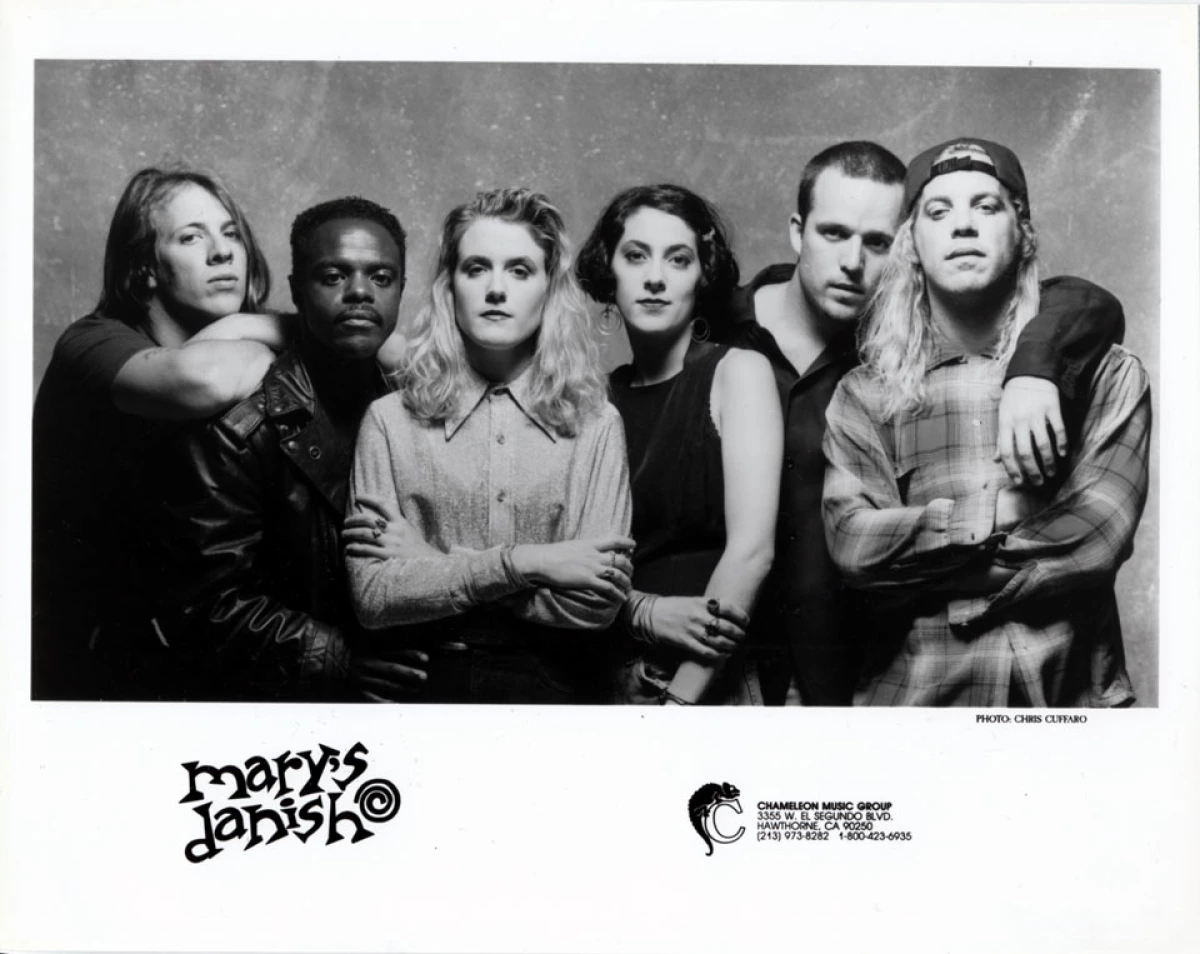Don't Let 'em Kill the Cowboy: A Chat with Mark Christian of The Big F
Discography:
The Big F (Elektra, 1989)
Patience Peregrine EP (Chrysalis, 1993)
Is (Chrysalis, 1993)
The Big F was formed out of the ashes of ‘80s new wave titans, Berlin. Once drummer Rob Brill and bassist/vocalist John Crawford decided they didn’t want to make music like “Take My Breath Away” anymore, they amped up the sound and their image as well and linked up with well-known session guitarist Mark Christian. After releasing their debut on Elektra in late 1989, the band toured with the likes of Soundgarden and Voivod. After the disappointing reception of their 1993 sophomore disc, Is, the band split. John Crawford is now back in Berlin and Christian leads his own country-rock guitar outfit, Merle Jagger. In May 2022, he graciously set aside some time to talk about the Big F and what that ride was like and what he’s up to now.
Pete Crigler: What got you interested in music and playing guitar?
Mark
Christian: Growing up in Southern California near Hollywood in the 1960s and
70s I was exposed to many of the bands coming out of LA at the time, which was
a hotbed for Rock n Roll music on local hit radio and TV. Also near my home
town was the Fender Musical Instrument company. The influence of hearing rock music
on hit radio and seeing the bands on TV, and seeing Fender guitars in the local
music stores I was sold on getting one of those Fender guitars and learning to
play. You can bet the Beatles, Stones and other UK Invasion music groups
weighed in heavily as well for me to further investigate learning to play
guitar and starting a band. While the other kids were playing sports, I was
obsessed with learning the guitar. I took piano, flute and drum lessons too but
the guitar seemed to be the one instrument that won me over. The 60s and
70s LA and Southern California bands that really motivated me at an early age
were The Beach Boys and surf music, The Byrds, The Doors (my school principal
was Corky Courson, Jim Morrison’s father-in-law), The Monkees, The Eagles,
Creedence Clearwater, Iron Butterfly. Also, I discovered the Blues as a teen
buying the records of the Three Kings, Johnny Winter, Hendrix, Clapton, Allman
Brothers. I cannot leave out my folks buying me the records of Roy Clark, Les
Paul, Chet Atkins and Jose Feliciano to further influence their kid learning
guitar. Jose lived near where I grew up so he was a big influence. Country
music was a big influence as well. It was all about the guitar with all of
these bands and music artists growing up. Guitar was the thread that ran
through all of it for me.
Pete: Tell
me about some of your early bands.
Mark: My
first professional working band was a night club cover band during my high
school and college years, which got the attention of a manager for an Elvis impersonator
named Alan whose tribute to Elvis had just became one of the number one Las
Vegas shows following the recent death of Elvis in 1977. I got the gig and
toured the world until we landed at the Aquarius Theater in Hollywood 1979.
After a couple of years of session work I saved up some money to start my own
band called Dial M. A sort of new wave synth and guitar pop duo. Rob Brill was
our drummer for a short spell. He then joined Berlin. We signed to RCA in 1982
for one full length album and an EP released in 1983. This band was short lived
till the Big F formed in 1988. I did have another band after Dial M in 1984
with a singer songwriter friend and bassist Howie Epstein and drummer Jimmy
Hunter from the Village People session songwriting band I was in. We never
played a show but made a demo tape. Howie gave the tape to Tom Petty's
recording engineer who he was working with at the time with Del Shannon. The
engineer gave the tape to Tom Petty and Tom asked Howie to join the
Heartbreakers. The rest is history.
The Elvis
impersonator show landed at the Aquarius Theater in Hollywood 1979. It was
there that a friend of mine got me hooked up with producer Robert Margoleff who
had produced the Stevie Wonder records in the 70s. He was producing a country rock
singer. This got me started playing on recording sessions. In 1981 another
friend hooked me up with the Village People founder and producer Jacques
Morali. I was hired to form a band to write and record the music for Village
People record called Renaissance. This band featured bass player Howie
Epstein unknown at the time till later on he joined Tom Petty and the
Heartbreakers 1984 till 2002. After Renaissance, Morali hired us to
write songs and music for a Cher record called I Paralyze. She ended up
only using one song. She was wonderful to work with by the way. After Cher I
was flown to Compass Point studios in Nassau, Bahamas to play on a record that
Robert Palmer was producing. He was producing an artist named Moon Martin. Moon
was famous for writing "Bad Case of Loving You." Throughout the 80s I
continued to play on movie and TV soundtracks and many band demos. I appear on ‘The
Karate Kid 1’ soundtrack, and “That Was Then, This Is Now” to name a couple
from back then. One session of note was the Monkees comeback record in 1987
called Pool It. It was an honor to get to play with a band you idolized
as a kid. After the Monkees I got the call from Rob Brill to play on Berlin's
5th and last record, Berlin Best Of.
Pete: How did you come together with Rob and John to form TBF?
Mark: As
the 1980s were coming to a close it was obvious that music was changing again.
The Sunset Strip metal scene and UK pop bands had reached the saturation point
and were fading out. Not sure really about what was going on, lost in the
session world, however I was soon to find out playing on Berlin's last record
that Rob had called me for. Rob told me that after I finished the record he and
John had an idea for a new band and that Terri Nunn would be going solo. Sure, I
said, I’m up for anything. They were a little ahead of their time and played me
the demo recordings of Soundgarden and Dinosaur Jr who were not signed yet but
soon to be. They were underground indie bands with a buzz. This is what we want
to go for now they said. Hmm I said, sounds like garage band music. Who is
gonna sign that? LOL. So John and Rob had this idea to get a 24 lock out music
studio and start jamming till we came up with our own sound. This idea was
familiar with me as I had a few bands that did that like Dial M. We jammed 5
days a week for 8 months in 1988. We auditioned a few singers but none fit the
mold. During the songwriting process John was spontaneously singing most of the
melodic ideas while playing bass. Finally, we decided to go with John singing
and keep the band a three piece. After a year’s time we had a full length
record written and our own unique sound ready to showcase.
Pete: Was
the band's music Rob and John's direct attempt to sound nothing like Berlin or
was it a natural course?
Mark: Both. They knew
they wanted to explore the new buzz band sound called Grunge. Or Grunge Metal.
No one really knew what to call it back then. They seemed fed up with being pop
stars with cookie cutter songs restricted from being able to have their own
artistic freedom. They felt that Berlin was once a cool indie band that was
hijacked by the corporate record label machine. So, the Big F's music was
certainly an intentional huge departure from Berlin's 80s synth pop sound. We
defiantly had our influences to use as a guide line for the new sound. Which
consisted of the Cream, The Who, Hendrix, The Cure, The Replacements,
Motorhead, Masters of Reality, Soundgarden, The Pixies, XTC and maybe Metallica.
At the end of a year’s time woodshedding for a sound we landed on a very well-crafted
three-piece modern sound. We were very pleased.
Pete: How
did the band sign with Elektra?
Mark: Perry
Watts-Russell was Berlin’s manager. He supported the idea of John and Rob
branching off. Perry was a very shrewd and crafty business manager. He loved
our new sound and crafted the idea along with John and Rob to change their
names and try to sell the band as unknown new guys playing the Sunset Strip; which
we did. However, our sound did not fit in with the last of the Sunset Strip rocker
people. We were told by the clubs to never to come back and play again, that
out music was too far out there. But there was a new MTV buzz going on with the
new bands like The Cult and Soundgarden. And with that, Perry wrangled all the
major labels out to see the band, and they all loved us in spite having no
following on the Strip. Peter Lubin at Elektra made the best offer for us. He
had signed the Pixies, 10,000 Maniacs and Faster Pussycat to name a few. Peter
thought we were right in there with the times.
Pete: What
was it like making the first album?
Mark: Really
exciting. We were very well rehearsed and did very few overdubs. The first record
was mostly live in the studio. We had the top-notch studios, engineer and mixer
at the time. And we were all experienced studio musicians. We knew exactly what
we wanted and were anxious to get the record done and out. At first, we met
with Vic Maile to record the record who had recorded The Who Live at Leeds
and Motorhead. Sadly by the time we were ready for him he passed away. So we
went with up and coming engineer/producer Dave Bianco who just done Masters Of
Reality.
Pete: How
would you describe the band's amount of 'success'?
Mark: At first with the record release Jan 1990 and our winter and Spring tours with Soundgarden, we earned the crown of best buzz band among all the bands coming out at the time. We were every band’s favorite band to like. The Cult, Soundgarden, GnR, Screaming Trees, Nirvana, LA Guns all mentioned in their magazine reviews that the Big F was their fave new band. Unfortunately this buzz success did not translate to favorable record sales. As the many bands we toured with went on to major success Elektra gave up on our record campaign due to poor record sales. So we went back in to do the second record. Once the record was near finished Elektra decided to let us go. Perry quickly got the second record from Elektra and sold it to Chrysalis. At this time the Grunge metal movement was ending. Trends were moving to Rap, Ska and female singer songwriter music. By 1995 it was all over replaced by Sheryl Crow, Alanis Morissette, Radiohead, Snoop Dogg, Blink 182, No Doubt... etc.
Pete: What was the inspiration behind songs like Kill the Cowboy and Patience Peregrine?
Mark: At this time I was
not a lyric writer yet. Just melody and music. I wasn’t sure what John and Rob
were saying with their lyrics. I knew that they were going as obscure and
underground as possible. Kill The Cowboy was defiantly a social commentary
statement of the times to Not Kill the Cowboy. The Cowboy being the American
dream threatening to be deconstructed by evil forces within and abroad. Patience
Peregrine, I have no idea what that was about other than the video depicted
some kind of political shenanigans going on in Mexico with the
US.
Pete: What
was it like touring with Soundgarden and Voivod?
Mark: Great.
Everyone was excited about being a part of the early 90s sound. Especially
Soundgarden because their Louder Than Love record was taking off. We all
got along very well and became a traveling family for 6 months. Soundgarden was
doing so well they left the tour for a bigger one by mid-summer that year.
Again, both bands were excited to be playing with their new fave buzz band, The
Big F.
Pete: Was work started on a second record for Elektra?
Mark: Yes.
Early 1991, Elektra decided that the first record was a no sale and that they
thought it would better to go back and make our second record instead of
continuing to tour. Looking back in retrospect, I think we should have kept
touring and spreading the news. But then again, I wasn't the one financing the
tours.
Pete: Was
the band dropped or just leave the label?
Mark: So
what happened was at the end of 1991, Elektra stated that Grunge Metal was on
the way out and rap and female singer-songwriters were in. So, it was decided
to shelve our new record to play a wait and see game. They also offered to sell
the record to us for a bottom dollar price. That is when Perry Watts-Russell
stepped in and masterminded a deal to buy the record from Elektra for a bottom
dollar price and sell it to Chrysalis for a profit.
Pete: How
did Chrysalis come to the rescue and do you feel it was a good move for the
band?
Mark: Chrysalis
had just been sold to new owners and Fred Davis, son of record tycoon Clive
Davis was heading up the A&R. He was already a Big F fan from the buzz we
had going on. He jumped at the chance to take on the Big F's second record and
signed us before any other labels could get a bid in. I thought the move to
Chrysalis was good because the enthusiasm was there to pick up the pieces from
Elektra and really try to break the band.
Fred and
Chrysalis really put in a great effort to make The Big F happen. But the very
reason that Elektra dropped the ball on us came back to haunt Chrysalis and The
Big F in the end. And that was the fact that our kind of music was on the way
out for the new up and coming trends. Chrysalis also hit hard times in the mid-90s.
I don’t remember what happened next. Either Chrysalis folded or we broke up
first. Or both not sure. But the Grunge Metal run was over for everyone with
exception of the bands that broke out big from the late 80s early 90s
era.
Pete: How was it working with Ed Stasium on Is?
Mark: Ed was great to
work with. He figured out right away that we were in control of our own music
and production. So he kind of acted as a cheerleader and mediator between the
three of us because we were always competing for the production chair and at
times became confrontational. We also had recorded most of the record before he
showed up. He did a great job overseeing the music and mixing the record. We
were famous for producing our own first record that didn't sell. So it was
decided by Watts-Russell and Chrysalis to bring in a name producer as a co
producer.
Pete: Was
it disappointing when the album didn't take off?
Mark: Yes
very much so. We all had high expectations. Chrysalis did their best to break
the band. But the timing just wasn't there anymore for us and the public wasn't
buying the music.
Pete: How
did Sheldon Gomberg come to the band; was it to allow John more freedom on
stage?
Mark: Yes. Sheldon was a friend of Rob. But the real reason to get a dedicated bass player was because from day one Elektra and Watts-Russell thought that maybe John's voice together with playing bass was failing the music. And that if he just played the role of singer and front man only, that might free him up for improvement. There were times where it was suggested to have John just play bass and get someone else to sing with a more radio friendly voice. I preferred the struggle of the three-piece band idea. It made us more authentic and angsty.
Pete: Was work attempted on a third record?
Mark: No. We never got that far. If we had, the title of the third record would have been another word to make a sentence out of all the would-be future record titles. The Big F, Is, - fill in the blank. Well I guess the third record would have been be called “Finished.”
Pete: What caused the band to split up?
Mark: Basically,
when a ship is sinking the fingers start pointing. But the real issue was the
music just wasn't taking off. Failing after two major label deals created
some really bad morale. We were not getting along and the show dates were with
smaller bands struggling to get by and smaller venues in smaller towns. MTV
wasn't playing our videos anymore either. After escalating tensions between Rob
and I over just about everything, at the end of our 1992 tours John and Rob
decided to replace me. That didn't go well for the band and lasted about a few
weeks. Then John and Rob decided to end the band and dissolve the partnership.
Not sure if Chrysalis was folding at the time but they did shortly after. We
never spoke to each other again till 2002. I heard from Rob because he needed
some guitar for his girlfriend’s recordings. We buried the hatchet and I was
able to reconnect with John too. John hired me out as well for some of his solo
recordings. We all realized we were much older now and the past was the past to
forget. I was on to my new Country Rock guitar thing as well.
Pete: What
were you up to after the split?
Mark: I was
hungry to get another band going and get back in the game. I had been working
as a hired gun guitarist and music producer throughout most of the ‘90s working
with indie bands. Finally in 1998 one band I produced got a major label deal
with Time Bomb Records. The band was called Disappointment Incorporated and was
kind of a cross between Jane’s Addiction, Radiohead and Beck. One full length
record and an EP was released in 1999. We toured with Godsmack, Hole and Kid
Rock. This band was short lived as the end of the ‘90s was basically the
end of rock music as we knew it. I bailed out of this situation and went back
to producing bands. 2002, I decided to team up with some session players I had
been working with over the years to start an indie Americana country band. They
were members of Dwight Yoakam's band and we all worked at Dwight's recording
studio, Mad Dog Studios doing session work.
Pete: What
are you doing now; tell me about some of your current projects?
Mark: Yes, well in 2002, I really got in to playing country music. I felt that rock was dying out and that country was blowing up. I didn't want to be an ageing dinosaur rocker looking for some love from the retirement home folks. I needed to find an all-ages art form that celebrated guitar music. I was right. The Americana indie and commercial Country Rock music took over record and ticket sales in the early millennium. And still is. I started an instrumental country rock guitar band; art for arts sake while still working as a music producer. There was also a big country music scene in Hollywood that had replaced the rock scene from the ‘80s and ‘90s. Now all the young cats in town had cowboy hats and snap shirts replacing the hair and mascara snake bands. Not to mention the Silverlake indie scene Beck came out of was happening too. Anyway, my instrumental band set out to play some country nights around town. I then started my own country night that blew up to be the no. 1 Indie Country night in LA called The Ranch Party. It lasted from 2005 to 2020; pandemic shut it down. I had country bands coming from all over the US to play. The popular show I had going prompted an indie label to sign my instrumental guitar band Merle Jagger. The name stands for Country Rock. Merle = Merle Travis legendary Country picker and songwriter. Jagger = Country Rock and Blues. Merle Jagger has done well and has a new record deal and record out this July 15th called Trash Talking Guitars. This record has vocals now with me singing. Merle Jagger music also got me featured in Guitar Player Magazine 2009 Jan issue. They had me perform my Country instrumental "Hillbilly No 9" at their guitar superstar show. To date, Merle Jagger is my no. 1 band and we tour and have a good Americana fan base. Some Big F fans show up to our shows from time to time. It’s still all about the guitar for me. And that’s what you get at a Merle Jagger Show. Guitar jams and band jams.
Pete: Do you keep in touch with Rob and John?
Mark: So, I
noticed a while back that the Big F had a good size fan base on YouTube posting
our MTV videos and posting all of our recordings. I then noticed that neither
of the labels that signed us were in business anymore and that you could not
buy the music anywhere. So, I decided to see if I could get the rights to the
music and sell it myself. In 2017 I got a lawyer on this and they were able to
track down the rights. The first record had ended up at Warner Music
Group, the second one at Universal Music Group. Neither label was willing to
release the music to me however they both ended up releasing the music again on
digital. I was relived because now the Big F music lives on streaming forever
for all the fans to enjoy. Anyway, contracts needed to be signed for all of
this. So I got in contact with John and Rob. Rob was still kind of bitter and
had quit music to live with his son while in college. He said he was done with
rock and had a funk band going with his son. John and I met at a Berlin show
here at the HOB. We had a little reunion and talked about him getting back with
Berlin. Which he did and is much more of a happy camper now. Funny thing, in
the end I am the only band member that talks to the fans and keeps the Big F
music alive on social media and steaming.
Pete: What
do you hope you and TBF will be remembered for?
Mark: Good
question. Looks like we are being remembered for exactly what John and Rob
wanted from day one. And that was to make a classic subversive insurgent record
that would win us our own loyal fan base. That kind of happened 25 years later
thanks to the internet. What a surprise.






Comments
Post a Comment